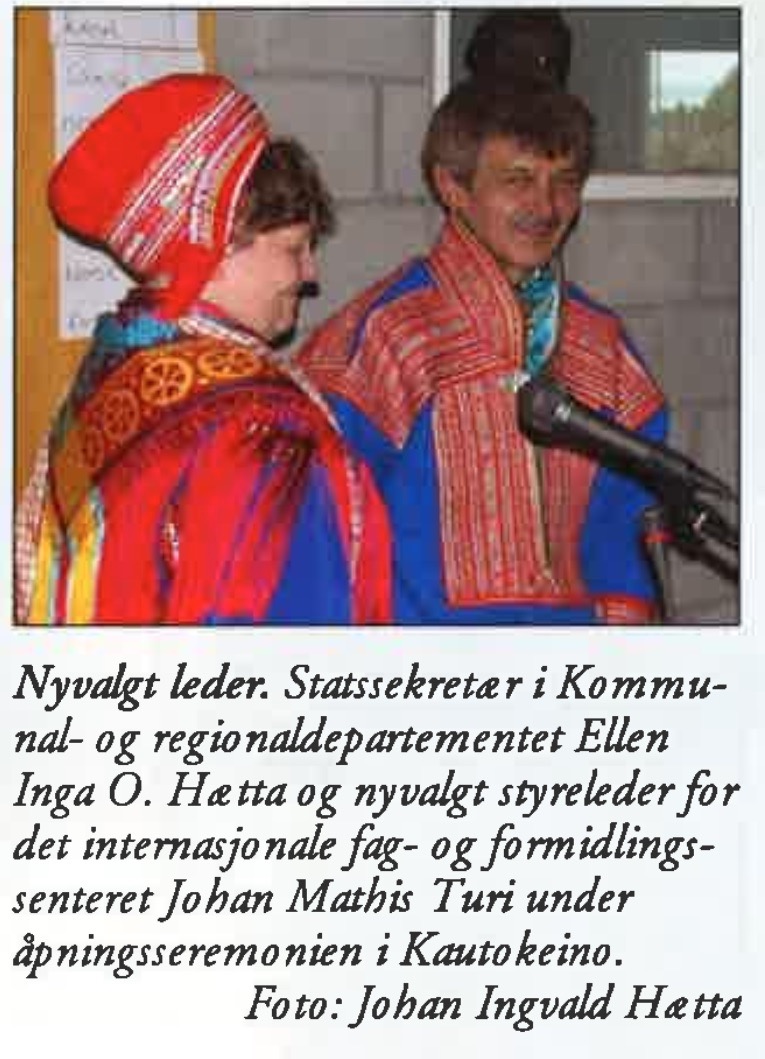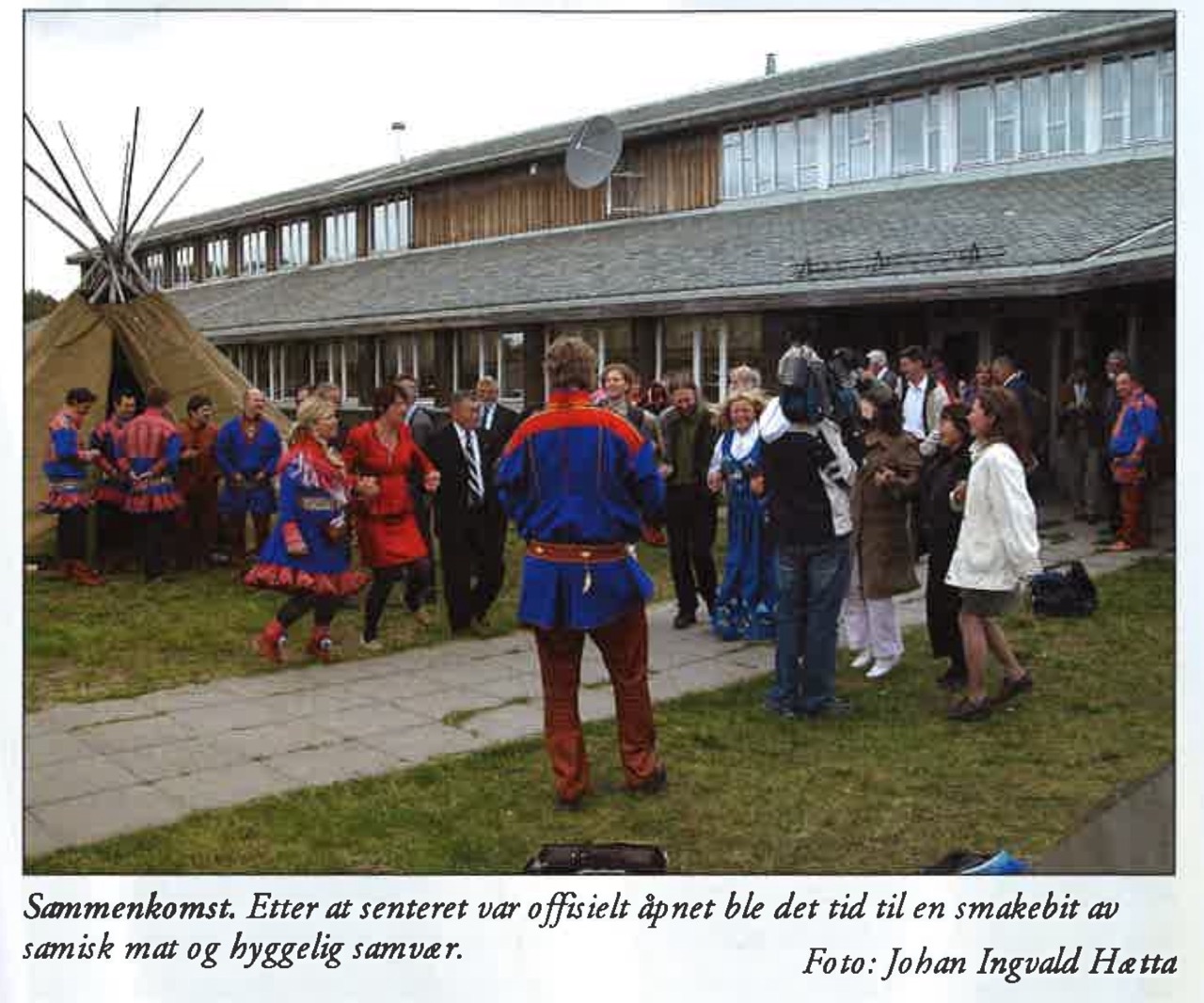20 years ago today the Norwegian Government established the International Centre for Reindeer Husbandry (ICR) in Kautokeino, Norway. On September 2nd, 2005, Erna Solberg,  the Norwegian Minister for Regional and Internal Affairs officially opened ICR to an audience that included several regional, national and Sámi politicians and locals in Kautokeino, in the heart of Finnmark, Norway in the centre of the Sámi reindeer husbandry area. The center was established to support the cross-border people-to-people cooperation between the world's reindeer herders, which began in 1990 when the Berlin Wall fell. The establishment of ICR was proposed in the first NOU on the High North in 2003, and was also supported by the Arctic Council. The first elected Chair of ICR’s Board was reindeer herder from Kautokeino – Johan Mathis Turi.
the Norwegian Minister for Regional and Internal Affairs officially opened ICR to an audience that included several regional, national and Sámi politicians and locals in Kautokeino, in the heart of Finnmark, Norway in the centre of the Sámi reindeer husbandry area. The center was established to support the cross-border people-to-people cooperation between the world's reindeer herders, which began in 1990 when the Berlin Wall fell. The establishment of ICR was proposed in the first NOU on the High North in 2003, and was also supported by the Arctic Council. The first elected Chair of ICR’s Board was reindeer herder from Kautokeino – Johan Mathis Turi.
Over the past 20 years, ICR has grown into a vital hub for cooperation among the world’s reindeer herding peoples, connecting communities across the Arctic and beyond. Its mission has remained consistent: to document traditional knowledge, support sustainabity in reindeer herding, and give a voice to reindeer herders and youth in global discussions on climate change, food systems, and Indigenous issues.
Building Bridges Across Borders
From its very beginning, ICR has functioned as an independent professional institution with international reach. It has become the Secretariat for the Association of World Reindeer Herders (AWRH) and later World Reindeer Herders (WRH), ICR established EALÁT Institute for Circumpolar Reindeer Husbandry within the UArctic, and built partnerships with leading academic, Indigenous, and governance organizations. These connections have allowed reindeer herders’ perspectives to be heard in arenas such as the Arctic Council and the United Nations.
Research and Climate Resilience
ICR has spearheaded groundbreaking projects that combine traditional knowledge and scientific research. The EALÁT Research Project, part of the International Polar Year, documented how herders adapt to climate change and land-use pressures.
The Nomadic Herders Project, launched in 2010 with UNEP and UArctic, explored how climate and land use affect nomadic pastoralists, while also building dialogue with policymakers. This initiative later became the base fot the GEF UNEP Reindeer Herding and Resilience project, emerged around 2020-2021. This ICR’s project is a global initiative integrating Indigenous reindeer herding knowledge with sustainable land and pasture management. The project produced the 2023 Progress Report, conducted workshops (e.g., reindeer milking in Mongolia), presented to Norwegian legislators, and featured at high-level Arctic climate conferences.
Through such initiatives, ICR has helped demonstrate that Indigenous knowledge is not just cultural heritage—it is a vital tool for resilience in a rapidly changing Arctic.
Preserving Knowledge and Culture
One of ICR’s most celebrated contributions has been the documentation of reindeer herding traditions, particularly food culture. The EALLU project, led by reindeer herding youth, created international awareness of reindeer based cuisine, adaptation knowledge, and generational storytelling. The resulting cookbook received global recognition, winning the Gourmand Foodbook Award in 2018.
Empowering the Next Generation
Youth have always been at the heart of ICR’s mission. Over the past decade, ICR has organized training programs and workshops that equip young reindeer herders and Indigenous youth of the Arctic with leadership skills and cultural pride.
In 2022, Indigenous youth from across the Arctic gathered in Norway and later at Harvard University to learn leadership, crisis management, and communication skills. ICR continues its collaboration with the Harvard Kennedy School’s Belfer Center and is planning additional educational events for Indigenous youth. Since 2022 ICR has also been cooperating with the Tufts University’s Fletcher Maritime Studies Program on creating training programs for Arctic Indigenous Leaders and organizing courses for Indigenous youth and reindeer herders.
These programs ensure that the next generation of herders can carry forward both practical skills and the confidence to represent their communities internationally.
Sharing Culture with the World
Perhaps the most visible expression of ICR’s work is the NOMAD Indigenous FoodLab, a mobile kitchen that brings Indigenous food culture and reindeer based cuisine to global audiences. From international food festivals to policy gatherings, the FoodLab has introduced the world to the flavors of the Arctic, while sparking conversations about food sovereignty, Indigenous resilience, and cultural diplomacy.
Looking Ahead
As it marks its 20th anniversary, the International Centre for Reindeer Husbandry stands as a unique institution that has successfully blended traditional wisdom with modern science, strengthened cultural heritage, and amplified Indigenous voices on the world stage. From Arctic tundras to global forums, ICR has shown that reindeer herding is not only a livelihood, but a cornerstone of Indigenous identity and resilience in the 21st century.
Photos by: Johan Inguald Hætta, opening of ICR in 2005, Guovdageaidnu (Kautokeino) Norway
Today, let us celebrate the ICR’s anniversary and honor the importance of reindeer herding traditions by listening to a speech from the first ICR Chair and founding President of the Association of World Reindeer Herders (AWRH) , Johan Mathis Turi, at training seminar for talented and emerging Arctic Indigenous leaders.



